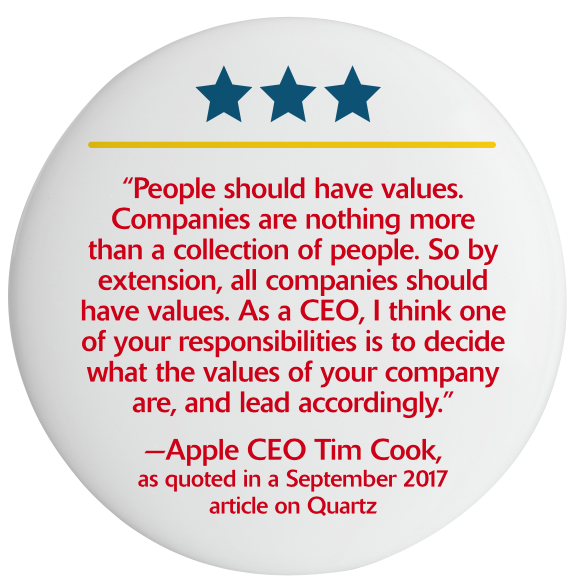These days, it doesn’t take long for a retailer or brand to become embroiled in political controversy. As politicians dance around the issues they are elected to address, more and more brands and retailers are taking a hard stance and making their opinions heard. Just last week, Nike made the bold move to issue a statement siding with the NFL players and owners who took a knee during the national anthem. Is using their platform to make political statements a recipe for disaster or a way to connect with consumers?
Let’s take a look at a few recent examples pulled from the headlines and see whether they had success or were a cautionary tale.
 Success: German Grocery Retailer Edeka Takes a Stand Against Anti-Immigration Sentiments
Success: German Grocery Retailer Edeka Takes a Stand Against Anti-Immigration Sentiments
In August 2017, an Edeka grocery store in Hamburg, Germany removed all foreign-made products from its shelves for a day in order to highlight the importance of diversity. The move came in response to growing anti-immigrant sentiments in Germany, following an influx of more than 890,000 refugees since the country opened its borders to those seeking asylum in 2015.
The move didn’t just leave shoppers seeking imported specialty items in a lurch—it cleared many shelves throughout the store of much of their normal selections. (Check out a video at www.edeka.de/vielfalt.jsp.) Reactions from Edeka fans on social media were largely positive, with consumers adding images of store shelves and their own hashtags like #fightagainstracism and #saynotoracism.
In an article in AdWeek, an Edeka spokesperson was quoted as saying, “Edeka stands for variety and diversity. In our stores we sell numerous foods which are produced in the various regions of Germany.… But only together, with products from other countries, it is possible to create the unique variety that our consumers value. We are pleased that our campaign caused so many positive reactions.”

“So empty is a shelf without foreigners.”
 Success: Under Armour, Tesla, Merck, Campbell Soup and More Quit Presidential Advisory Councils
Success: Under Armour, Tesla, Merck, Campbell Soup and More Quit Presidential Advisory Councils
Within days of taking office in January 2017, United States President Donald Trump announced the formation of a manufacturing advisory council that would be comprised of high-profile CEOs from a variety of industries, including fashion, technology, pharmaceuticals and food. Several CEOs who agreed to serve on the council took heat from some consumers on their participation.
For example, electric car maker Telsa CEO, Elon Musk, faced a lot of criticism for joining the council of an administration that seemed to question climate change. At the time, he stated via Twitter “I understand the perspective of those who object to my attending this meeting, but I believe at this time that engaging on critical issues will on balance serve the greater good.”
Several other CEOs faced similar objections and responded in kind—at least for a time. Following the President’s announcement in June that the U.S. would be withdrawing from the Paris Climate Agreement, Musk stepped down from the manufacturing council, stating via Twitter “Climate change is real. Leaving Paris is not good for America or the world.”
In August, after President Trump made controversial statements about a fatal white supremacist rally in Charlottesville, Virginia, CEOs from Merck, Under Armour, Intel, 3M and Campbell Soup Company announced they were leaving the council as well.
Merck CEO Kenneth Frazier said in his resignation statement, “America’s leaders must honor our fundamental values by clearly rejecting expressions of hatred, bigotry and group supremacy… As CEO of Merck and as a matter of personal conscience, I feel a responsibility to take a stand against intolerance and extremism.” The other CEOs who resigned from the council before it was ultimately disbanded due to lack of participants expressed similar sentiments.
Though the President himself took to Twitter to criticize first Merck’s CEO then others, public sentiment toward Merck was largely positive. According to market research company YouGov, consumer perception of the pharmaceutical company rose significantly following Frazier’s resignation from the council. Under Armour and Intel saw similar results, according to YouGov. Whether due to this event or other forces, it is also interesting to note that Merck’s stock rose 1 percent on the day Frazier resigned and continued to climb through mid-September.
 A CAUTIONARY TALE Starbucks Tries to Promote Conversations about Diversity through “Race Together” Campaign
A CAUTIONARY TALE Starbucks Tries to Promote Conversations about Diversity through “Race Together” Campaign
Among increasing racial tensions, particularly between African American communities and local police in communities throughout the U.S. in early 2015, global coffee chain Starbucks attempted to spark discussions about race and diversity through its “Race Together” campaign. The campaign encouraged the Starbucks baristas to write “Race Together” on customers’ coffee cups and to use conversation starters such as “My children have [X] friends of a different race.”
The campaign was widely mocked by consumers—receiving 2.5 billion largely negative impressions in its first 48 hours—and generally labeled a failure by branding experts. Some criticized Starbucks for not first looking at its own (mostly white) leadership or for trying to advance a particular political agenda, while others questioned the appropriateness of the venue for such a serious discussion.
“To be focused on the big issues of the day is a great idea, but what’s the right venue? Not waiting in a rush line in the morning,” Paul Argenti, professor of corporate communications at the Tuck School of Business at Dartmouth College, was quoted as saying in the March 27, 2015 issue of The New York Times.
When Starbucks ended the campaign just a couple of weeks later, CEO Howard Schulz continued to stand by the intent of the campaign. But a year later in an interview on the topic with Fast Company, he was quoted as saying, “We made a tactical mistake…. We’re moving forward.”
As these examples illustrate, making a political statement can bring rewards—and backlash—for retailers and brands. To be sure, not all customers appreciate retailers and brands getting political. In fact, a 2017 poll by market intelligence firm CivicScience showed that the majority—67 percent—of Americans don’t think brands and companies should comment on politics.
But that same poll showed very different results when you break out consumers by age and/or the retailers they shop. For example, consumers under the age of 18 are 84 percent more likely to say that brands should publicly comment on politics, and Millennials are 25 percent more likely to say the same. Consumers who have a favorable view of more progressive brands, such as Whole Foods, Tesla and Beats by Dr. Dre, are also more likely to support companies making political statements.
So how can retailers and brands decide whether stepping into the political fray is right for them?
Understanding customers, showing authenticity and accepting the potential for backlash for any stance are key. Knowing the core customer and their values can help retailers or brands connect with that audience if it is done correctly.
The importance of authenticity can’t be understated, says Dave Harvey, Vice President of Thought Leadership for Daymon. “Consumers who align themselves with brands that have shared values can detect insincerity much quicker with today’s immediate access to information and transparency. They can identify when companies are putting up a façade of these values—and that can be more detrimental than ever making the statement,” he says.
Retailers and brands who already have a clearly established identity may have the easiest time of navigating these political waters. Retailers like Whole Foods, Amazon and Trader Joe’s are the kind of retailers and brands that customers know stand for something specific. It’s easier to make that connection. Other more mass marketed retailers like traditional grocers, their brands don’t always have that kind of depth of meaning. It could be a challenge to take a stand and develop an identity with their shoppers—but that’s also an opportunity.
For mainstream retailers, their target is so broad, it can be harder to take a stand without alienating some portion of their consumer base, says Harvey. “It may be a little bit safer to back more benign social causes their customers believe.”
“You’re seeing a lot more retailers and brands get on board with issues like sustainability, reducing food waste and Fair Trade policy,” Nicole Peranick, Director of Thought Leadership – Culinary, points out. “And I believe that retailers should get social like this. At the end of the day, it’s not so much about getting political so much as it is aligning with your customers’ values.”


